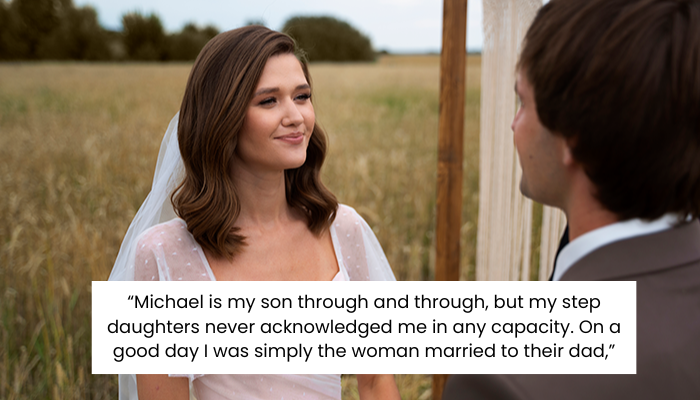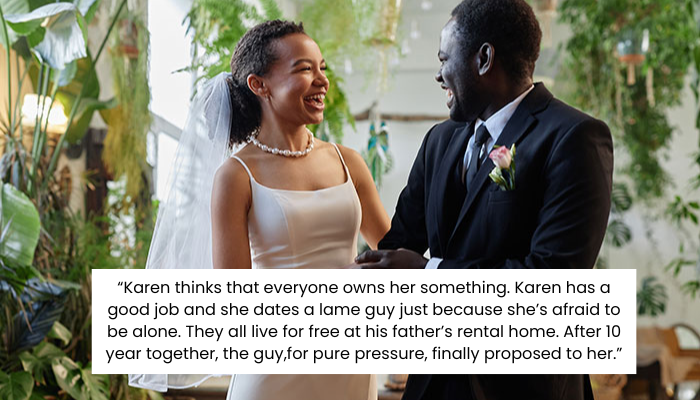AITA for Not Treating My Step-Grandkids the Same After Their Moms Rejected Me?
This story is soaked in emotional complexity and decades of hurt. At its core is a 52-year-old woman, married to her husband of many years, with three biological children and three stepchildren from her husband’s first marriage. The stepdaughters—Eva (38) and Lisa (36)—never accepted her. Despite her efforts over the years, she was never acknowledged as any sort of parental figure. On good days, she was invisible. On bad days, she was openly mocked as a “pick-me girl.” The stepdaughters even cut contact for years, only reconnecting when they wanted financial support for weddings and homes—something their father (the OP’s husband) provided.
Now, those same daughters are upset that the OP doesn’t treat their kids—the step-grandchildren—the same as her biological grandchildren. They’ve gone as far as to launch a guilt campaign through extended family. But the OP stands firm. She’s polite to the kids, includes them in group activities, and gives them gifts, but she doesn’t feel any emotional bond or desire to play the doting grandma role to children whose mothers clearly wanted nothing to do with her.
The key question: Is she heartless for keeping that emotional wall up, or is she just protecting herself from more hurt?
Sadly, parental or grandparental favoritism is way more common than it should be

This story is another one about it, but with a twist – this time it’s a grandmother explaining why she plays favorites


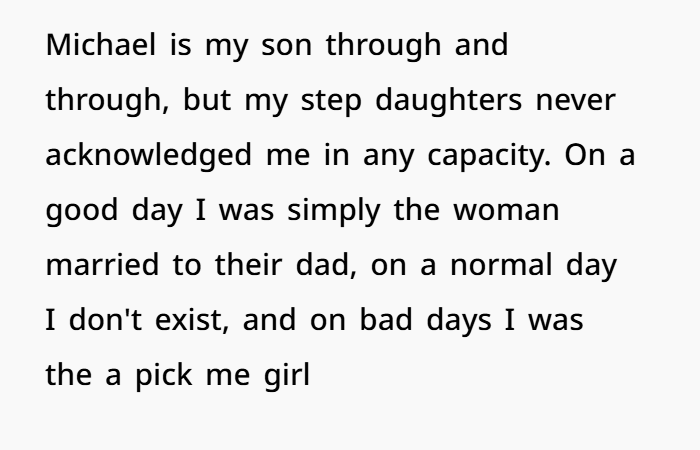
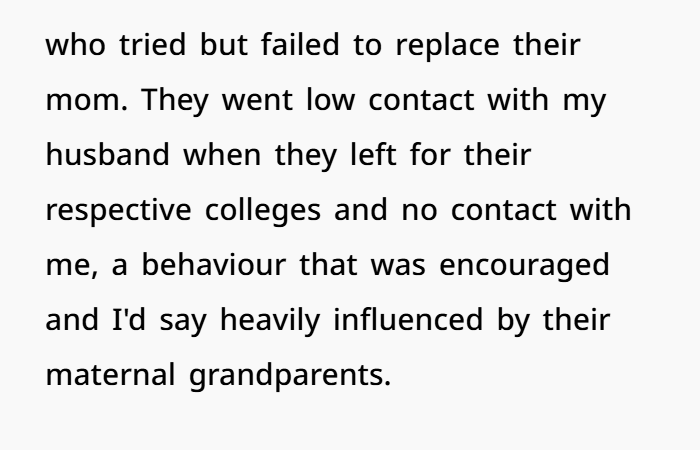
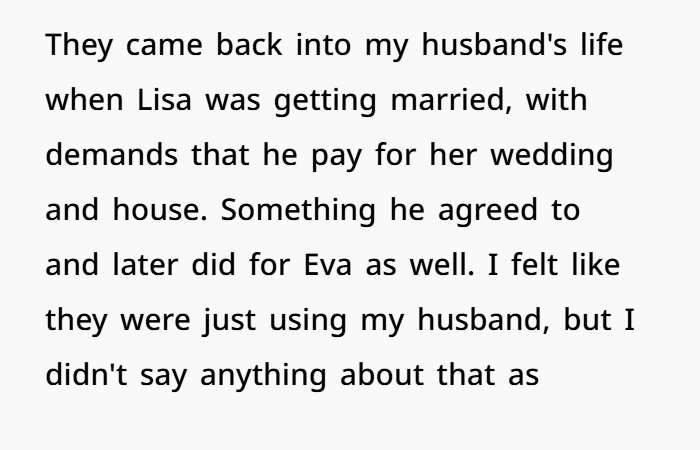
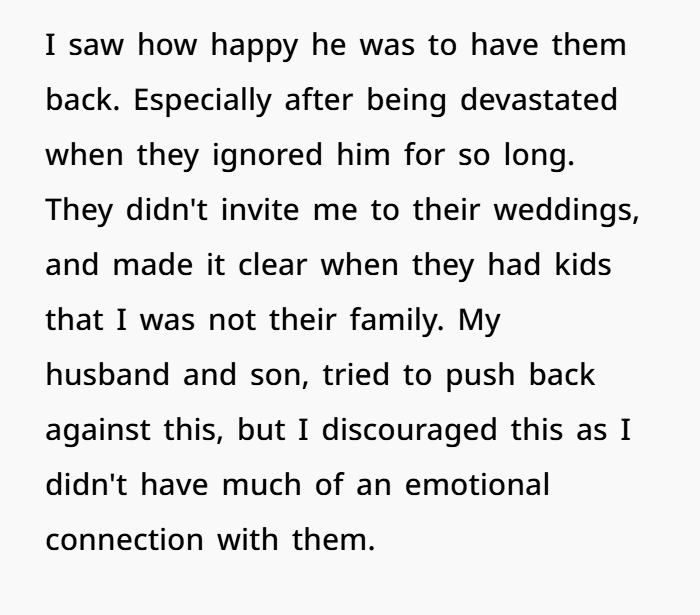


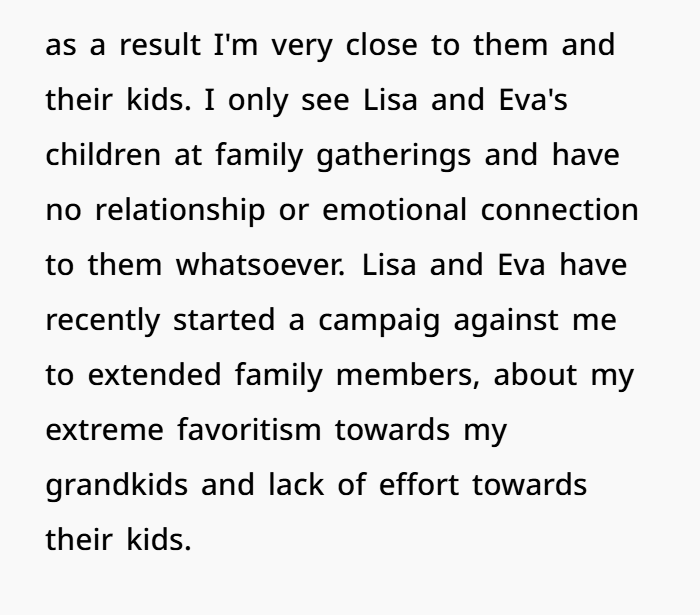

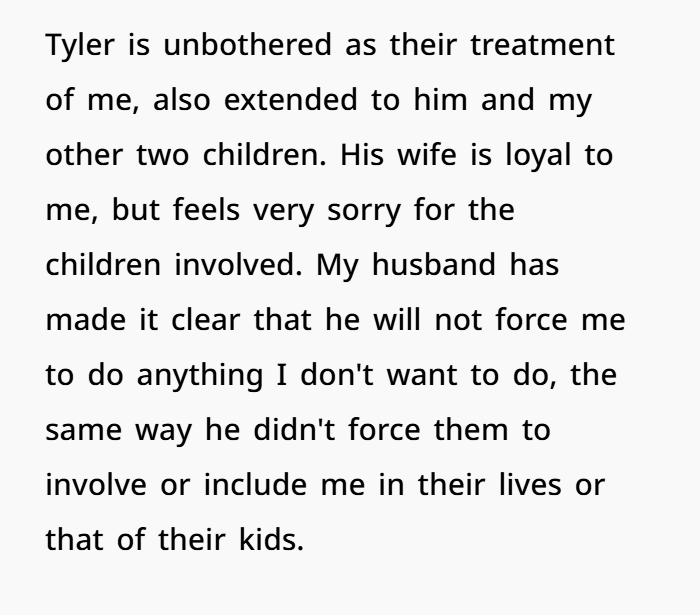

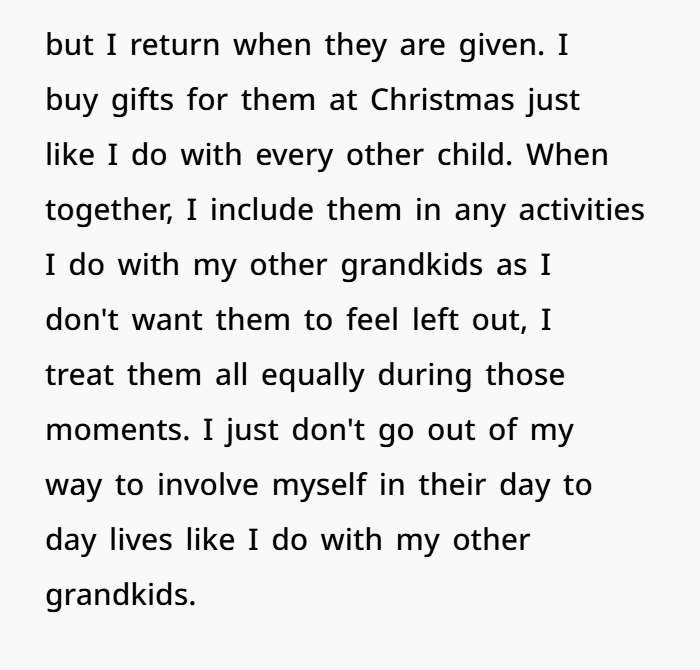

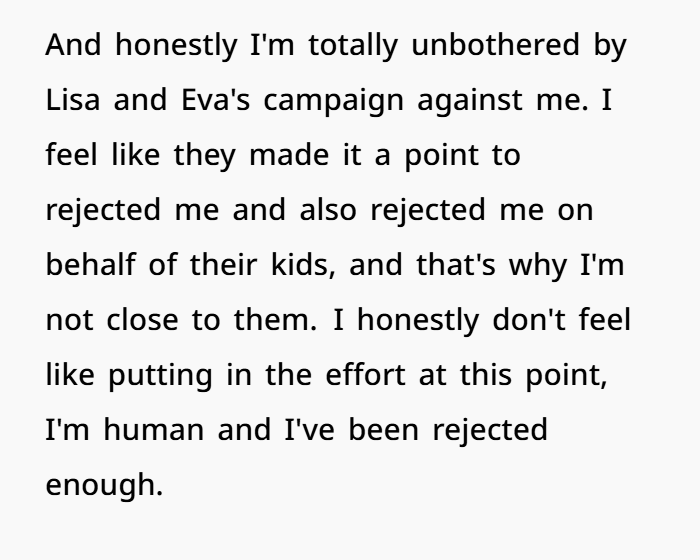
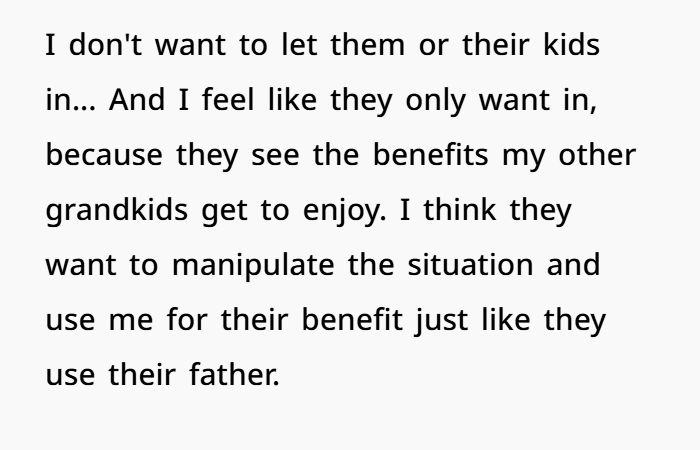
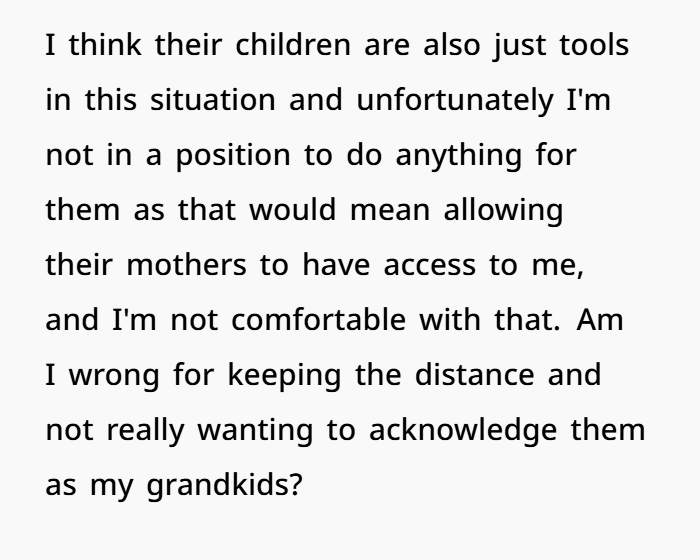
Let’s get real here—stepfamily dynamics are a minefield. There’s love, loss, resentment, guilt, and loyalty all tangled up. And when kids grow up into adults still clinging to resentment, things don’t magically get easier.
This story isn’t about children being mistreated. It’s about an adult woman choosing not to open her heart to a group of people who repeatedly shut her out—and are now angry because they see the benefits of being “in.” Let’s explore the deeper psychology, family relationship norms, and the honest realities of emotional boundaries and obligation.
🚪 Rejection Has Consequences—Even If You Regret It Later
First, let’s address a universal truth: You can’t cut someone out for years and then be mad they didn’t keep a seat warm for you.
When Eva and Lisa chose to not only distance themselves but actively exclude their stepmother from weddings, family celebrations, and the lives of their children, they made a clear statement: You’re not family to us.
That’s their right. No one should be forced to have a relationship they don’t want. But guess what? That door swings both ways.
Just as they had the right to exclude the OP, the OP now has every right to protect her peace. Emotional bonds don’t form just because kids exist. Grandparents form connections through shared time, inclusion, and care. You can’t sow exclusion and expect to reap closeness later.
🧠 Psychology of Step-Parenting and Grandparenting
Studies show that stepfamily relationships often mirror the quality of earlier parent–child bonds. If there’s no trust, no shared history, or active rejection, closeness rarely develops. This is especially true in cases where stepchildren view their parent’s new spouse as a “threat” to the memory of their deceased parent. (source)
In fact, adult stepchildren who lose a parent early may cling to idealized memories and resist step-parents even more fiercely than children whose parents divorced. That resistance often solidifies in adulthood, and it takes a lot of work to undo it—if both parties are willing.

In this case, the OP was willing… until it became clear that nothing she did mattered. That kind of emotional rejection has real effects. It’s called learned rejection, and it often leads to emotional withdrawal. Why keep pouring into a cup that keeps getting dumped out?
🎯 The “Why Now?” Question Is Crucial
One of the biggest red flags here is timing. Lisa and Eva didn’t come around when the OP was trying. They came around when they saw her with other grandchildren—and saw the warmth, support, and joy she shared with them. Now suddenly it’s unfair?
Let’s be honest: it feels opportunistic. And it likely is.
The OP suspects they only want a relationship now because they’ve seen what they—and their kids—are missing out on. But that’s not about love. That’s about access. About appearances. About what they feel entitled to.
And she’s not wrong to resist that.
👶 But What About the Kids? Innocence Caught in the Crossfire
Here’s where it gets sticky. The kids. They didn’t reject anyone. They didn’t exclude her. They’re just… there. And while the OP has made it clear she isn’t cruel or dismissive to them—she still doesn’t pursue closeness.
Is that unfair? Maybe. But it’s also honest.
Kids aren’t entitled to a grandparent’s emotional connection any more than a grandparent is entitled to theirs. Relationships are earned, not inherited—especially in blended families.
Also, let’s not forget: the OP hasn’t been given access to build those bonds. She’s polite, kind, inclusive when they’re around. That’s more than a lot of grandparents are. She’s not punishing the kids—she’s just not forcing what isn’t there.

🧱 Boundaries Are Not Cruelty
The word “boundary” often gets misinterpreted as coldness or punishment. But healthy boundaries are about self-respect. After years of being told “you’re not family,” the OP finally believed it—and acted accordingly.
Now that she has a chance to build genuine, loving relationships with her willing daughters-in-law and grandkids, she’s finally found her place. And she’s not wrong to guard it.
It would be different if Lisa and Eva came to her with accountability—saying, “We’re sorry for how we treated you. Can we build a better relationship now?” But that’s not what’s happening.
They’re going to extended family, complaining. They’re painting her as the villain because she’s no longer emotionally available. That’s not reconciliation—that’s manipulation.
Netizens thought that the woman playing favorites wasn’t that off-putting in this case, as there was a good reason for her to act this way
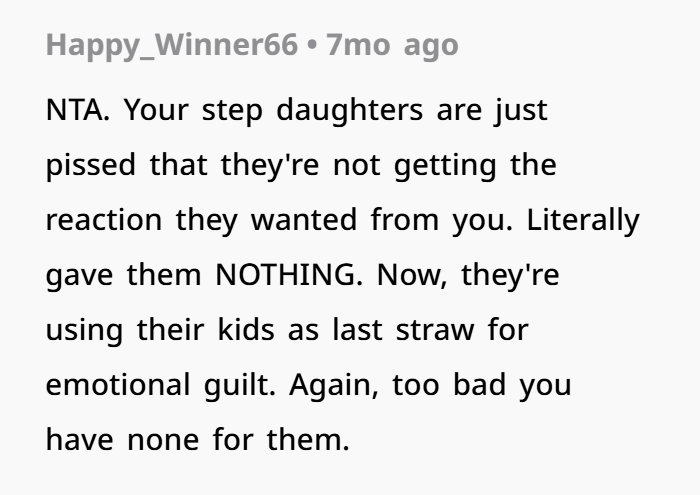
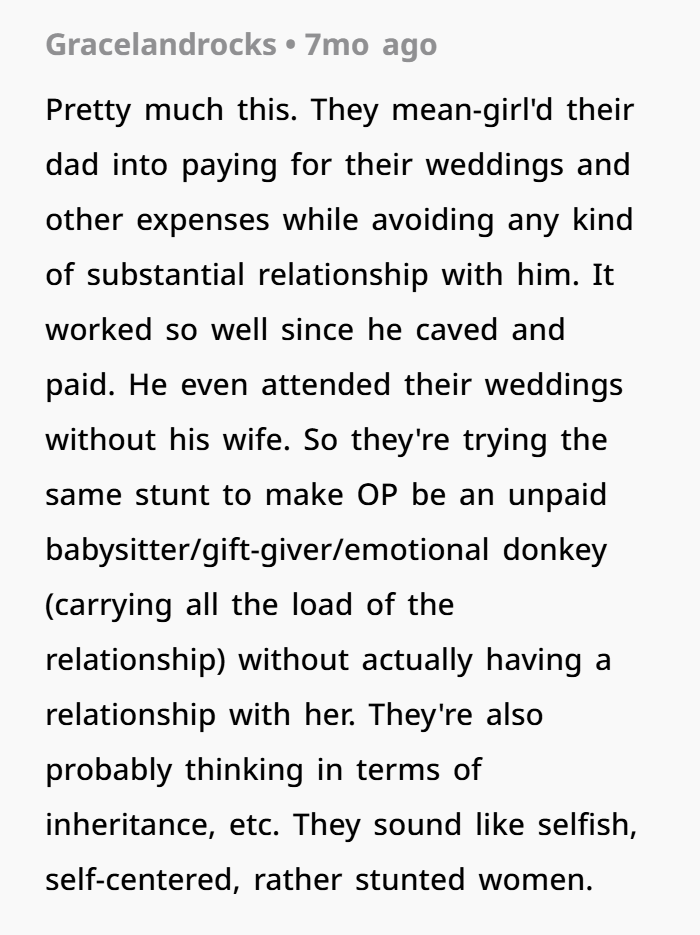
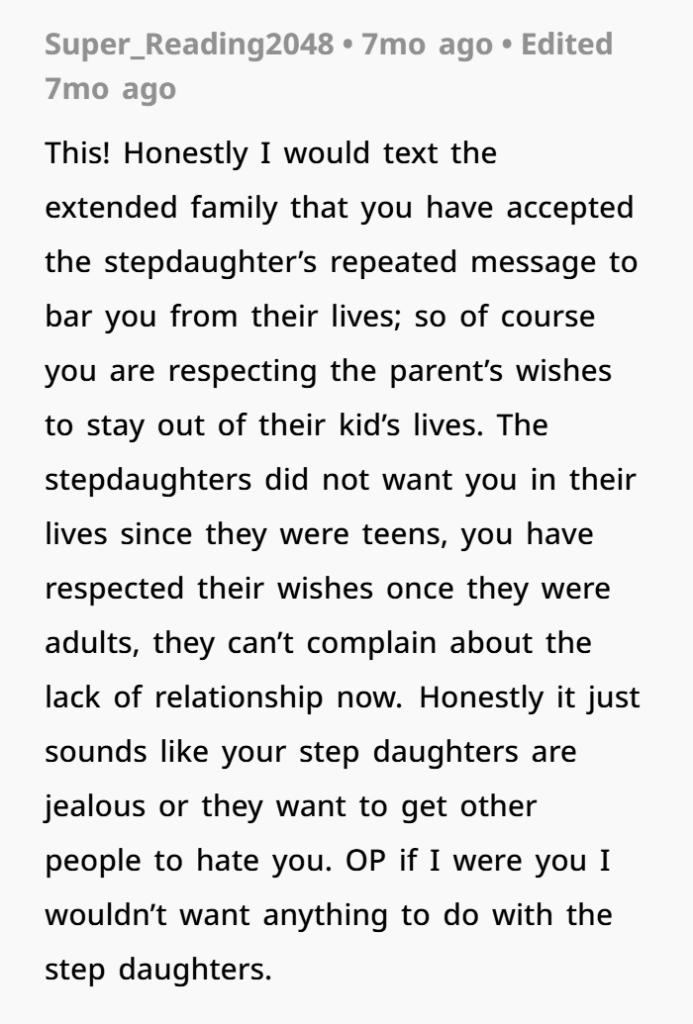

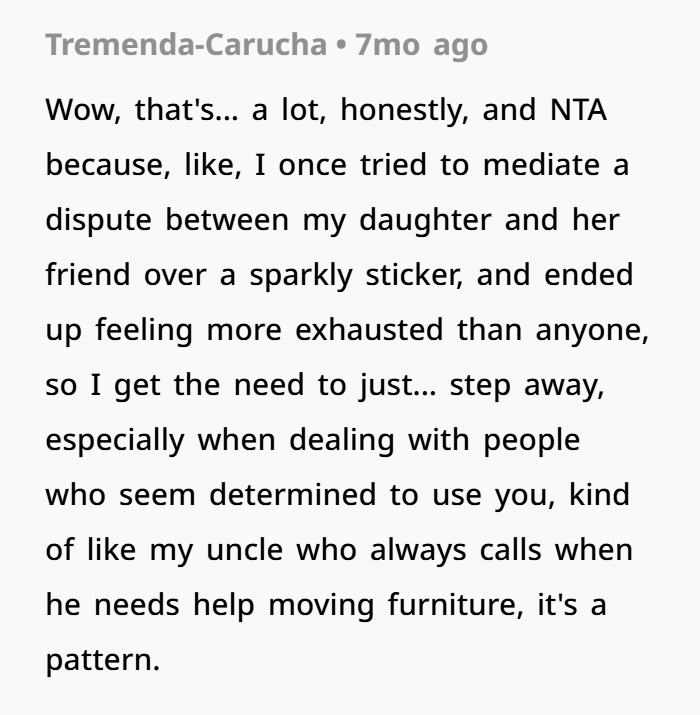
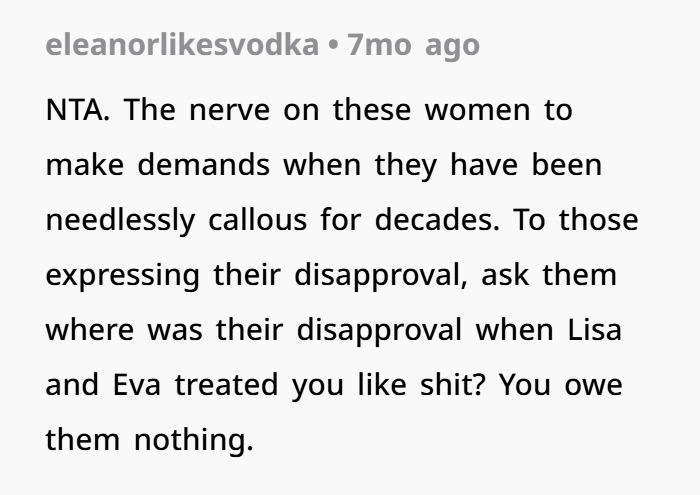
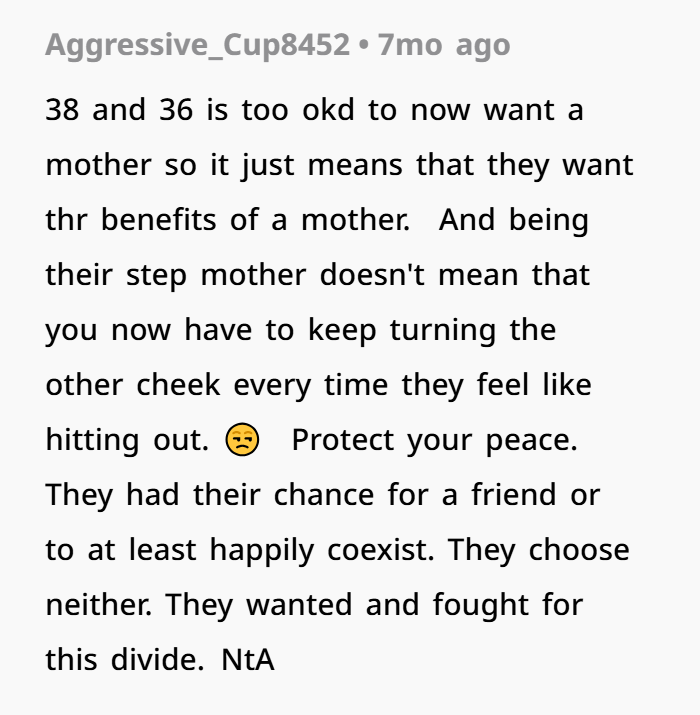
You’re NTA.
You were rejected for years. You respected their choices. Now you’re living your life with the people who chose to include you. That’s not favoritism—that’s reciprocity.
Your step-grandkids aren’t being mistreated. They’re simply not at the center of your world. And that’s okay.
If Lisa and Eva truly want to build something better, it has to start with them—owning their past behaviour, making real amends, and asking—not demanding—for inclusion.
Until then, you owe them nothing.

